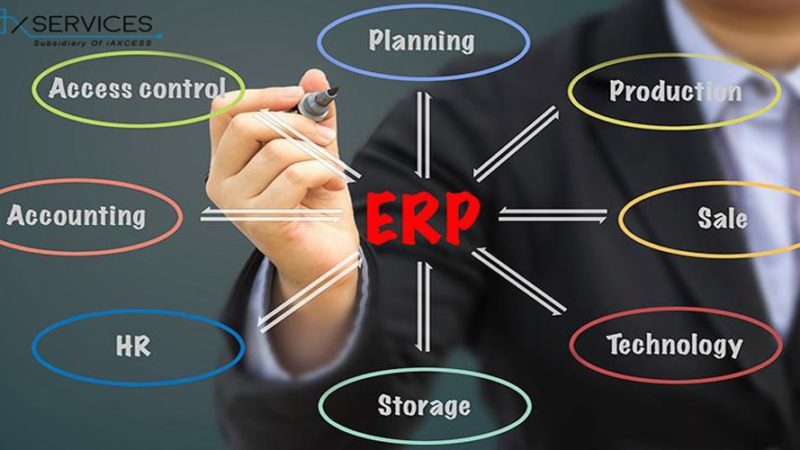Enterprise Resource Planning is the solution modern day world is bent on adopting, to enhance and improve their operations and management. ERP, at its core, is an automation and control attachment to the normal operations of the business – inventory and order management, accounting, human resources, customer relationship. These nodes are not only automated through ERP but they are also optimized through it.
There is a long list of benefits that come with an ERP solution. Some of them are mentioned here:
IT Cost Efficiency:
For an enterprise operating in the IT sector, spending money on dedicated staff for the operation and maintenance of every small infrastructural component can be a huge drain to the financial resources of the enterprise. A unified system on an Enterprise Resource Planning (ERP) solution saves cost of support teams, licenses and future training needs of the staff. Instead of using multiple software, your employees will have to work on only one – this saves time which is then invested into more mission critical activities, increasing efficiency and generating more revenue.
ERP also lets you integrate third party software into the mix. For enterprises that have built up their foundations on software which are necessary for their functioning can integrate them into the ERP.
Visibility of operations:
Through ERP solutions, the visibility of operations and everything attached with them are portrayed more visually digestible and easily accessible. This lets you access, view and understand every operational task going on in your organization or enterprise. You can evaluate and supervise any task regardless of the location of your physical presence or through any or all devices you have authorized.
Additionally, collaboration of the teams working on tasks gets more streamlined and unified because the interactions can be centralized for everybody to see in real time. Workflows will become better as well as increasing the communication efficiency between your employees.
Back-end tasks like inventory management, sales and purchase management, order indexing, attendance and employee record management can all be accessed through a single dedicated dashboard.
This increased visibility will further decrease the convolutions in your assessment of management tasks and translates into better decision making capability.
Reporting and analytics:
With a dedicated dashboard that provides Intel about any/every task going on the corporation, the reporting becomes very easier. Tasks can be updated as soon as they are done ownership of the task completion, fault allocation and performance indicators all can be observed and supervised. This makes usage of excel sheets and email obsolete. Inter departmental memos are no longer needed to inform the current progress of an operation. Tasks can be delegated across departments and can be compared after completion to calculate efficiency and performance of the employees.
With Artificial intelligence getting into the game, these data analytics can be used to provide key insights about your business directly to you. You can make intelligent business decisions – onboarding, expansions and cut downs gained through data harvested from previous dealing and operative normalcies.
Customization:
Many ERP’s provide a customized package to their customers. Ability to pick and choose greatly enhances convenience for your organization. You can choose the modules you want to be implemented to your network and pay according to the. Similarly, the customization differs with the mode of implementation. On-site is the physical implementation of an ERP system on ground while off-site is the cloud implementation. Third party providers provide reliable, uninterrupted installation and maintenance packages according to your needs.
Cloud implementation is the next big thing currently being observed in the organizations. Not only does it provide backup and recovery options but also a cost effectiveness and time-saving which is very valuable for the organization.
Customer Service:
ERP can greatly affect your customer relationships, in the good way. With a centralized database of the customers available to your support teams, the interactions between the clients and your teams becomes much more clear and efficient. Every engagement is documented, with little left room for inconsistencies through miscommunication. This flawless system provides a relaxing experience to the client which is highly sought after in the business world. A central database also lets you engage with clients and get feedback by helping you in drafting personalized messages and offers.
Data Security:
A unified platform for sharing and using data – both confidential and public, increases data security by preventing data leaks when sharing cross-platform. ERP gives layers of access to the utilization of data and can provide safeguard against intrusion because of a reserved, single point entry. Company’s data, through an ERP, will remain in the most updated form and delays of getting the correct version of data are reduced.
An additional layer of security can be provided to the mix by uploading your data to the cloud. Around the clock experts can then be set up by your ERP provider to observe and prevent any malicious attempt of breaking in.
Improved supply chain:
Through a specifically designed ERP, supply chain tasks – inventory management, procurement, buying and selling, delivery transportation and workflows can be automated and made efficient. This automation results in shortened delays in buying and selling, on-time deliveries and which enhance the overall operation and success of your business. Similarly, for stocks and inventory, instead of guessing what the uptake should be, automation and business intelligence insights help you in making precise value decisions on how and when to update inventory – saving costs and time.
A lot of Enterprise Resource Planning (ERP) Solution software is available in the market. Microsoft Dynamics 365 is one of the biggest names in the market with the highest scores from Gartner (research and advisory company) for excellent modern technology architecture use cases. Dynamics 365 is a mix of ERP and CRM which provides a wide range of functionalities with all included benefits mentioned above.













